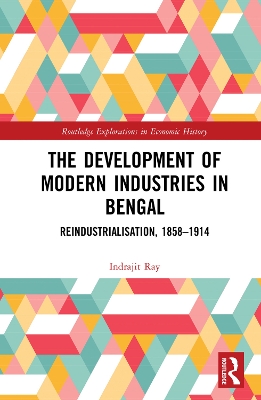Routledge Explorations in Economic History
1 primary work • 3 total works
Book 51
Bengal Industries and the British Industrial Revolution (1757-1857)
by Indrajit Ray
This book seeks to enlighten two grey areas of industrial historiography. Although Bengal industries were globally dominant on the eve of the industrial revolution, no detailed literature is available about their later course of development. A series of questions are involved in it. Did those industries decline during the spells of British industrial revolution? If yes, what were their reasons? If not, the general curiosity is: On which merits could those industries survive against the odds of the technological revolution? A thorough discussion on these issues also clears up another area of dispute relating to the occurrence of deindustrialization in Bengal, and the validity of two competing hypotheses on it, viz. i) the mainstream hypothesis of market failures, and ii) the neo-marxian hypothesis of imperialistic state interventions.
Bengal’s traditional industries, once celebrated worldwide, largely decayed under the backwash effects of the British Industrial Revolution in the first half of the nineteenth century. Although colonial ambivalence is often cited as an explanation, this study also shows that a series of new industries emerged during this period.
The book reappraises the thesis of India’s deindustrialisation and discusses the development status of the traditional industries in the early nineteenth century, examines their technology, employment opportunities and marketing and, finally, analyses the underlying reasons for their decay. It offers a study of how traditional industries evolved into modern enterprises in a British colony, and contributes to the broader discussion on the global history of industrialisation.
This book will be of interest to scholars of Indian economic history as well as those who seek to understand the widespread effects of industrialisation, especially in a colonial context.
Through two World Wars and the Great Depression, this book explores the turbulent history of colonial Indian industry in the period immediately prior to independence.
Focusing on five major industries in Bengal - coal mining, iron-smelting, jute manufacturing, paper making and tea plantation - the book looks at the impact of the war efforts on production, employment and capital: some industries experienced rapid growth due to additional investment, others suffered due to the dislocation of markets. Moreover, by drawing lessons from the war economy (especially the dearth of various essential commodities including war materials), the colonial government took up various measures in the inter-war period to promote India's domestic industries for the first time. Additionally, the book also argues that many of the expatriate firms in India became financially weak because of the Depression which paved the way for the 'Indianisation' of corporate houses. These elements were significant factors in the decline of British industrial hegemony in India and aided the de-colonisation process which followed.
This book will be of interest to scholars of Indian economic history as well as those with wider interests in decolonisation, industrial history and the first half of the twentieth century.


